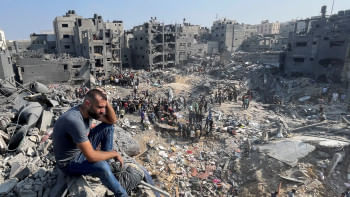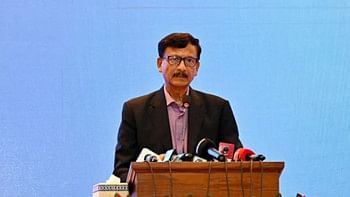The unfortunate paradise that was Palestine

Before typing words that will require me to somewhat dissociate from what its spells, let's listen to a tale of a place named al-Mawasi. It was a Palestinian Bedouin town, a slender coastal area, one kilometre wide and 14 kilometres long. The Mediterranean Sea hugging its rough grasslands, the people of al-Mawasi would farm and fish.
In late October last year, the Israeli occupation forces designated al-Mawasi as a "safe area" for fleeing Palestinian civilians, later claiming that it was considered a "permanent safe zone." In an interview with Channel 4 News on February 12, Israeli spokesperson Eylon Levi, when pressed to confirm if displaced civilians would be safe from further bombardment in the declared safe zone, stated that "it will not be safe" until Gaza was free from Hamas.
Gaza's health ministry reported that over 40,000 Palestinians were killed by Israeli strikes in the first 10 months of the war, with many buried under the rubble. On September 18, the UN General Assembly passed a resolution demanding Israel end its occupation of Palestinian territories within a year, with 124 nations in favour, 14 against, and 43 abstaining.
Meanwhile, as per CNN, Israeli Prime Minister Benjamin Netanyahu is considering evacuating civilians from northern Gaza to target Hamas and secure the release of hostages. Israeli airstrikes on Hezbollah targets have killed hundreds, and Hezbollah retaliated with rocket attacks, including a ballistic missile aimed at Tel Aviv.
While these events occurred, hundreds of thousands of Palestinians from Gaza, Khan Younis and later Rafah fled to al-Mawasi. The city now consists of makeshift shelters, misery, starvation, disease, and a near-constant threat of attack.
Now amid the recent escalating violence, the US and its allies are calling for a 21-day ceasefire between Israel and Hezbollah as the conflict threatens to engulf Lebanon. The measly number of days is shocking, with all the world leaders clapping for each other, their faces veiled in appropriate gravity, and deciding the fate of a people. How many days has it been since the aftermath of the October 7 attack? It has been almost a year.
There is no language left to describe the assault on Palestinian existence anymore. News keeps rolling like clockwork, every minute bringing a fresh attack that obliterates parts of the tiny little land Palestinians have left.
News has become, at best, just a documentation process. The faith that it will have an impact on the decision-making process of the rulers of the world is almost laughably absurd at this point. It will not jolt people out of their private lives and ignite a worldwide cry loud enough to save what is left of Gaza. Documentation, as of now, is our only means to soothe our conscience.
In February, the IOF attacked al-Mawasi, targeting a safe house for Doctors Without Borders (MSF) staff and families, killing two and injuring six. In late May, they bombed the area once more, killing at least 21 Palestinians, including 12 women, just days after the International Court of Justice (ICJ) ordered Israel to stop its offensive on Rafah. On June 21, the IOF attacked al-Mawasi once more, killing at least 25 Palestinians and injuring 50. "This killing is nothing short of the destruction of Palestinian life," South African lawyer Adila Hassim told the ICJ during a hearing on Israel's genocide case in January.
What moral standard does a country hold when in war they attack the place they themselves have declared to be a "permanent safe zone?" The Israeli authorities are not mincing words, and spokespersons like Eylon Levi are letting the world know exactly what they have in store. And so, newer and fresher courses of annihilation carry on.
The question of Palestine, says Edward Said, is "the contest between an affirmation and a denial." What the Israeli occupation is doing is denying Palestinians the right to exist.
There is a poem by Palestinian national poet Mahmoud Darwish named "Unfortunately, It Was Paradise." He writes, "We journey towards a home that does not halo our head with a special sun./ Mythical women applaud us. A sea for us, a sea against us."
I don't know what this poem would have felt and sounded like if Gaza was a land where children went to school in anticipation of sweet mischief. I see one of these mythical women named Abu Maamar, 36, embracing the body of her five-year-old niece Saly, in a Gaza morgue. She's shielding her grieving face and her niece's dead body from the camera. She draws a line: here, her grief is hers alone.
All I know is that I can disassociate because I'm privileged enough to do so. I know I cannot say "From the river to the sea, Palestine will be free," without a pulsating tick in the pit of my stomach that says otherwise. I know that al-Mawasi, now a land full of displaced people, may never get back to being the Bedouin town it once was.
Sumaya Mashrufa is sub-editor at The Daily Star.
Views expressed in this article are the author's own.
Follow The Daily Star Opinion on Facebook for the latest opinions, commentaries and analyses by experts and professionals. To contribute your article or letter to The Daily Star Opinion, see our guidelines for submission.

 For all latest news, follow The Daily Star's Google News channel.
For all latest news, follow The Daily Star's Google News channel. 





Comments